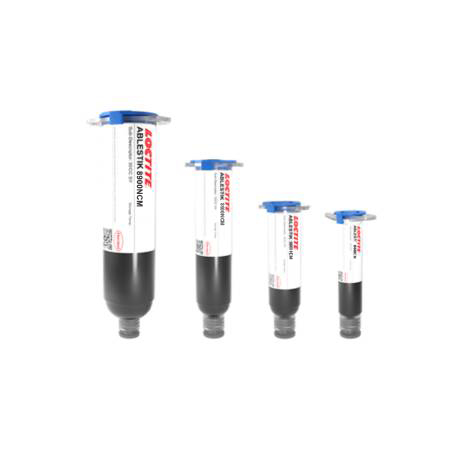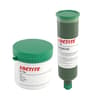LOCTITE ABLESTIK 8900NCM
Harmonization Code : 3506.10.00.00 | Prepared glues and other prepared adhesives, not elsewhere specified or included; products suitable for use as glues or adhesives, put up for retail sale as glues or adhesives, not exceeding a net weight of 1 kg
Main features
- Low resin bleed
- Non Conductive
- No CAT3 CMR substances
Product Description
LOCTITE ABLESTIK 8900NCM epoxy die attach adhesive is specially formulated for small to medium size packages. It is a white, heat curable, non conductive adhesive with low resin bleed and low voiding during the curing process. It has moderate stress absorbing capabilities and can dispense with minimal tailing and stringing.
LOCTITE ABLESTIK 8900NCM is PTFE filled and is suitable for bare, Ag plated and Palladium plated copper leadframes. Actual performance will depend on die size, aspect ratio and package design. This product is a green material, containing no CAT3 CMR substances. It is successfully used in Automotive applications as a low modulus, low stress solution on leadframes and can also be used for die stacking.
Cure Schedule
- 30 minute ramp to 175°C + 15 minutes @ 175°C
Technical Specifications
| General Properties | |||||||||
| |||||||||
| |||||||||
| Work life @25°C Work life @25°C Work life is the amount of time we have to work with a material until it is no longer able to be easily worked and applied on a substrate. It is based on the change in viscosity and it can rely on the application requirements. | 24 hours | ||||||||
| Physical Properties | |||||||||
| Thixotropic index Thixotropic index Thixotropic Index is a ratio of a material s viscosity at two different speeds in Ambient temperature, generally different by a factor of ten. A thixotropic material s viscosity will decrease as agitation or pressure is increased. It indicates the capability of a material to hold its shape. Mayonnaise is a great example of this. It holds its shape very well, but when a shear stress is applied, the material easily spreads. It helps in choosing a material in accordance to the application, dispense method and viscosity of a material. | 6 | ||||||||
| Viscosity Viscosity Viscosity is a measurement of a fluid’s resistance to flow. Viscosity is commonly measured in centiPoise (cP). One cP is defined as the viscosity of water and all other viscosities are derived from this base. MPa is another common unit with a 1:1 conversion to cP. A product like honey would have a much higher viscosity -around 10,000 cPs- compared to water. As a result, honey would flow much slower out of a tipped glass than water would. The viscosity of a material can be decreased with an increase in temperature in order to better suit an application | 10,000 mPa.s | ||||||||
| Chemical Properties | |||||||||
| |||||||||
| Mechanical Properties | |||||||||
| |||||||||
| Thermal Properties | |||||||||
| |||||||||





